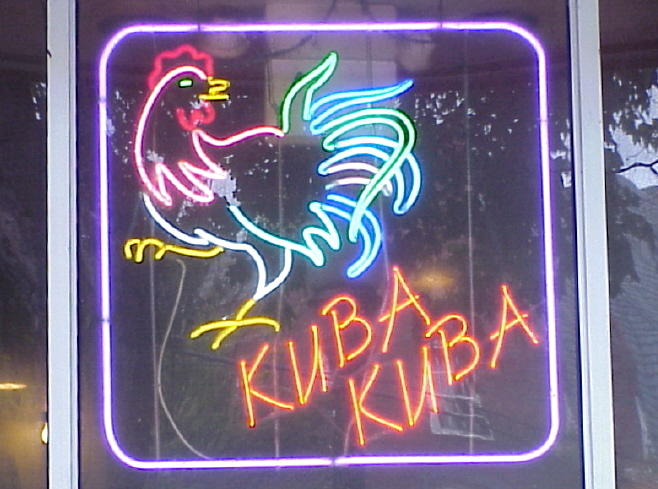By F.T. Rea
 On the Friday morning after Hurricane Isabel blew through town (Sept. 19, 2003), the sky was blue and the air smelled clean. The residents of the Fan District, at the heart of Richmond, Va., woke from an uneasy sleep. Day One of the unplugged life was underway.
On the Friday morning after Hurricane Isabel blew through town (Sept. 19, 2003), the sky was blue and the air smelled clean. The residents of the Fan District, at the heart of Richmond, Va., woke from an uneasy sleep. Day One of the unplugged life was underway.
Before the worst of the storm passed, about midnight, Isabel tossed huge trees around like a handful of pickup sticks. Power lines snapped. Cars were crushed. Roofs caved in and basements flooded. As the shocking devastation dealt out by the previous night’s onslaught of wind and rain was revealed to the stunned urbanites in the Fan, so too did the reality of widespread electricity deprivation.
Still, faced with all sorts of uncertainty and disconnected from the doings in the rest of the world, many wandering the streets like zombies on that morning faced the immediate problem that there was no hot coffee to be had.
For hundreds of his neighbors, Manny Mendez, owner of Kuba Kuba, took care of the coffee shortage on that surreal morning. Boiling water on the restaurant’s gas stove and pouring it over sacks (improvised coffee filters) in a big colander, Mendez and his staff doled out tasty Cuban coffee to anyone who stopped by.
While opportunists in other parts of town were marking up prices on candles, batteries, ice, generators and anything else for which the supply was short and the demand was great, Kuba Kuba was pouring strong coffee for one and all at no charge — free!
“What are we going to do [under these circumstances], charge people for coffee?” Mendez asked rhetorically with a shrug.When word got around that Kuba Kuba — at Park Avenue and Lombardy Street — had hot coffee, the crowd on the sidewalk outside the small restaurant swelled. Into the afternoon the size of the gathering fluctuated between 20 and 40 people at a time. Many neighbors met for the first time. By the time the coffee-making effort shut down in mid-afternoon, 100 gallons of free coffee had been served in paper cups.
By then several of Manny’s tables were on the sidewalk, with chairs arranged around them. Out came the boxes of dominoes.
The marathon dominoes scene continued for hours under the lights of a borrowed generator. Players sat in for a while, then sat out. Neighbors appeared with what they had in the way of libation. They swapped stories and the laughter from what had become an impromptu party drove off the demons that lurked in the eerie darkness, only 50 yards away.
Dominoes shark Manny Mendez was all of 6 years old when he boarded an airplane with a one-way ticket to a totally uncertain future in the United States. In 1968, for people such as the Mendez family, getting out of Cuba was worth the risk of fleeing into the unknown.
The day little Manny left Cuba, his father was thought to be in Spain, as he had been deported. His mother was crestfallen when told that there were no flights going to Spain on the day her family was offered its chance to flee what Cuba had become. Recently released from 13 months of confinement at an agricultural labor colony, she opted to board the Red Cross-sponsored Freedom Flight for wherever it was going.
On Aug. 2, 1968, that airplane took Judith Mendez and her two children, Manny and his sister, Judy, away from Cuba. It landed in Florida. Upon touching down, Judith Mendez called her relatives, who lived in Richmond, to tell them the good news.
To her surprise she was told her husband, Manuel, was already in Richmond.
After a spell in an apartment building at Harrison Street and Park Avenue, the Mendez family moved to the 3400 block of Cutshaw Avenue, where several other Cuban families had settled. There was one car, a ’56 Chevy owned by his uncle, for the whole group to share.
Manny’s father had been an accountant in Cuba; in Richmond his first job title was “janitor.” As time passed, Manuel Mendez improved his situation and became a leader of the growing Cuban community in Richmond by making regular trips to Washington, D.C., to buy the essentials for Latin cooking and other imported goods unavailable in Richmond.
“Papi, how often did we used to lose power in Cuba?” Manny asked of his father during one of the dominoes games.
In his distinctive accent, with the timing of a polished raconteur, Manny’s father rolled the “r” as he said, “Oh, about two or three times … a night!”
Those gathered laughed, having seen a glimpse of a wider perspective about coping with bad luck. Manny’s mother and the Cuban employees of Kuba Kuba laughed the loudest. Then, too, that may account for why Kuba Kuba routinely carries candles for sale along with other sundries.
The dominoes party broke up about 1:30 a.m. Most of the crowd returned to homes without power — with strange noises in the anxious quiet — no televisions, no Internet, and refrigerators full of risky food. No doubt, some of the dominoes players carried away from that night a new appreciation for people who can handle hardship with grace. Some may have even gained new insight into how it must be in places where millions do without power, in one way or another, most of the time.
-- 30 --
